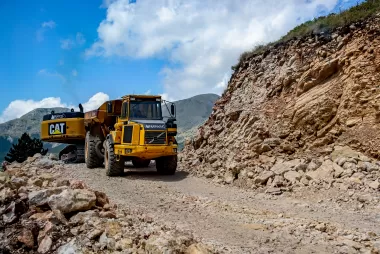
Blog
7 winning strategies for successful construction in Papua New Guinea
Last week, I was delighted to present at Offshore Energies UK’s Electrification in the Making conference in Aberdeen. Asset operators, service providers, regulators and industry experts gathered to discuss both the incredible potential and the tough challenges facing offshore platform electrification in the UK North Sea – a critical pathway towards industrial decarbonisation and delivery of the basin’s net-zero promise. Keeping these assets viable and powered from external sources will be a key enabler to future repurposing for green energy as well as CO2 injection into reservoirs for long term carbon sequestration.
Securing reliable domestic energy supply with as little carbon impact as possible is the offshore energy sector’s most critical imperative.
The North Sea Transition Deal, published in 2021, will see the UK's upstream oil and gas industry cut greenhouse gas emissions in significant increments between now and 2050, when it will be a net-zero carbon emission basin.
That cannot be achieved by just tapering off production.
Ultimately, society will still depend on conventional energy for decades to come, and this needs to be produced as sustainably as possible, and that’s where platform electrification comes in – it has the potential to radically reduce the carbon impact of the offshore energy sector, at pace.
Modifying existing offshore assets to connect them to renewable energy supply is no mean feat as it requires the deepest technical knowledge, the richest asset infrastructure understanding, and the pioneering and collaborative mindset that makes all the world’s biggest innovations possible.
During my presentation I reflected on the parallels we can draw between major, complex brownfield modifications projects – the conventional kind – and the complex projects that can enable electrification, except that I posed that the latter must be approached differently, given the varying levels of success in the industry we have observed historically.
Unlike in the case of planning for a tie-back to an existing asset, where the prized commodity is locked safely in the ground until the project is completed even when projects are recycled and delayed, projects to electrify assets are made viable, or not, by the remaining lifespan of those assets and the potential to make a return on the investment.
With electrification, we potentially introduce not only more stakeholders with their own criteria and drivers, but also the fact that any value from the project is intrinsically linked to what are effectively depreciating assets with a Cessation of Production date which may move, but ultimately will happen.
Unlike many of our traditional production enhancement projects, electrification needs collective agreement from multiple independent stakeholders but also delivers less value – by any measure – the longer we delay.
We cannot afford to get this wrong. The project scope, basis and economic appraisals needs to be correct, first time.
We need to spend the right amount of time at the front end determining what the right solution is. We need to tackle enough of the variables in the early concept phase to move to the subsequent phases of development with the assurances that this makes sense.
The truth is that there will be no silver bullet “template” solution to brownfield electrification, and each asset will need to be carefully assessed on its own merits. That does not need to mean that it is unobtainable – it just means approaching it with the right mindset.
With a solution-focused brief, a consistent thread of collaboration from concept to delivery, and with solutions grounded in the real world – this can be possible.
Indeed, I believe that we do not have another option. We need oil and gas, but we cannot afford to continue to produce it with today’s carbon intensity.
Can it really be achieved? Yes, I believe it absolutely can. We are systematically working the problem out now. There is uncertainty in the sector around the regulatory framework and future taxation and financing landscape for the industry, but as a leading service contractor, we have the expertise, the experience and the capability to do our part in this journey and, frankly, a larger and more leading role than perhaps we are used to doing in the past.
If you have any questions or would like to know more about platform electrification and how we can help you, please feel free to get in touch.